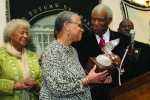Recalling 'the saddest day'

Nearly 150 years after his death, members of the Mountain Home community gathered to honor the legacy of President Abraham Lincoln and the lives of those he touched during an event Friday evening.
Held in conjunction with the 23rd Annual Black History Banquet, the event recalled what was once deemed "the saddest day" in U.S. history -- a reference to the assassination of the nation's 16th president on April 15, 1865.
Former Idaho Attorney General David H. LeRoy, who served as the guest speaker during the Mountain Home Black History Committee's yearly event, emphasized that people here and across the world are all connected by what he called "six degrees of separation." Simply put, every human on earth is indirectly related to one another in some way, he said.
In addition, people are "simply not very far away from being connected to historic people and places," he added.
For LeRoy, his fascination with the former president started when he was young and was something passed down through generations of his family. In fact, he maintains a sizable collection of memorabilia from the former president.
But it's his close ties to Lincoln that persuaded LeRoy to keep that legacy alive. One of his distant relatives was the sister of Lincoln's mother, Nancy.
"We are all tied to history," LeRoy said. "If you shook hands with me, then you're now related to Lincoln."
During his speech Friday evening, he helped connect several men with direct ties to the former president in addition to their links with the state of Idaho.
Among them was William Wallace, a personal friend of Lincoln known for his sense of humor. Wallace was the one that proposed the state's name, to which the president replied, "Idaho sounds just fine to me."
On a fateful day in April 1865, Wallace was invited by the president to attend a play titled, "Our American Cousin." However, Wallace had to decline the offer since his wife was ill, and he planned to stay with her.
Later that night, Wallace was awoken by the sounds of commotion on the street with people yelling, "The president was shot."
Wallace would go on to become Idaho's first territorial governor.
Another noteworthy individual was Mason Brayman, an attorney hired by Lincoln to settle a legal dispute with a railroad company. In addition to renting the president's home in Illinois, Brayman attended one of Lincoln's most-famous campaign speeches, known as the Cooper-Union Speech.
But what people may not remember is that Lincoln was struggling to keep the audience's attention during that campaign speech, LeRoy said. At one point, he asked people in the audience to give him a sign as to whether they could hear him. At once, Brayman raised his top hat above the crowd, which inspired Lincoln to deliver a powerful, moving speech that riveted the audience.
"Brayman was the man that made Lincoln president," LeRoy said. In time, he would move west to become governor of the Idaho Territory in 1876.
At Friday's banquet, the former attorney general also highlighted other noteworthy individuals like Ward Lamon, who he called an "expansive, exuberant man" that was among Lincoln's closest friends and his former law partner. In time, Lamon would go on to serve as Lincoln's personal bodyguard -- a man known for sleeping just outside the president's bedroom to ensure he remained safe.
In April 1865, Lamon was pulled away from the White House on an assignment in Richmond, Va. Before he left, Lincoln's friend urged the president not to go out at night, particularly the theater, until he returned.
The president's personal body guard had the sad duty of returning his friend's body back to Springfield, Ill.
While Idaho plays a key in the lives of these men, LeRoy added that even Mountain Home has a direct tie to Lincoln's legacy. He recalled a conversation with a local woman who was related to a man by the name of Austin Herrick -- a railroad engineer who was also a close friend of the president.
Herrick had the somber duty of returning Lincoln's body to its final resting place. In time, he would eventually move to Pocatello where he worked for the Union Pacific Railroad. On a regular basis, he would run trains across the state, which brought him through Mountain Home.
Reflecting on LeRoy's comments, Mountain Home Black History Committee President Mildred McNeal emphasized that these stories shed new light on the state's role in Lincoln's lasting legacy.
"It's really important for those who live and visit here to understand the history of this state," said Mildred McNeal. "It is a great place to live."
During last week's banquet, the Mountain Home Black History Committee also recognized five individuals for their contributions to the local community over the past year. They included Sadu Simpson, who received the committee's person of the year title. A former nurse, Simpson was lauded for her continuing service to the Mountain Home community as a volunteer with various organizations.
Also recognized at the banquet were Pastor Clark Williams and his wife, Dana, who received the committee's Martin Luther King Jr. Award. Meanwhile, 366th Fighter Wing Commander Col. Ron Buckley and his wife, Traci, were presented with the Thurgood Marshall Award.
